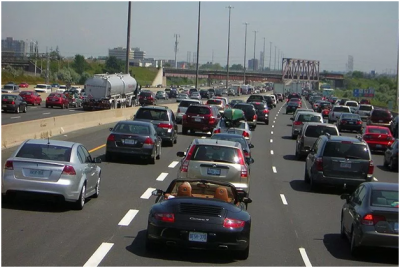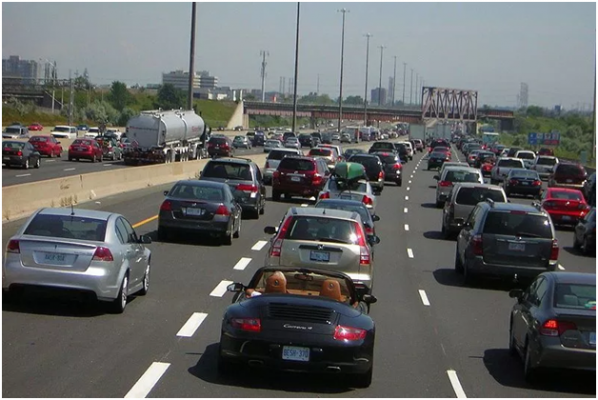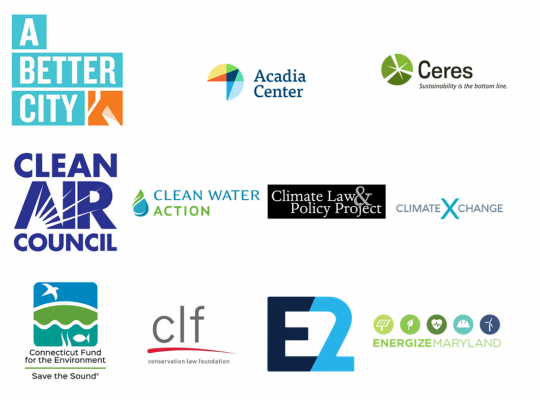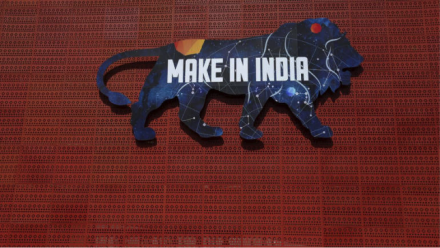42 Groups Join Together to Help Lawmakers, City Officials, Business Leaders Develop 21st-Century Clean Transportation Network Offering More Options and Serving the Needs Of All in the Northeast and Mid-Atlantic
Contributor: Mitchell Patrick – PR Newswire
WASHINGTON DC and BOSTON, April 30, 2019 – Forty-two local, regional and national groups today launched a new coalition, Our Transportation Future, established to help Northeast and Mid-Atlantic states (13 of them, see list below) develop a regional clean transportation system that protects public health, curbs climate-changing pollution, expands economies and improves the flow of commerce.
The coalition will support the states’ efforts to address (and build) a transportation system that is unworkable, outmoded and is the leading source of carbon pollution driving climate change.
OTF member-states: Connecticut, District of Columbia, Delaware, Maine, Maryland, Massachusetts, New Hampshire New Jersey, New York, Pennsylvania, Rhode Island, Vermont, and Virginia.
Our Transportation Future (OTF) is committed to finding solutions and modernizing transportation across the Northeast and Mid-Atlantic region. The coalition aims to help transform the region’s transportation system into a model for the nation that gets people in rural, suburban and urban communities where they need to go safely, more efficiently and with less exposure to harmful pollution.
OTF experts are taking an active role to educate state policy makers and the media. The new OTF website will provide important news, information and announcements about the ongoing efforts to modernize transportation across the Northeast and Mid-Atlantic states. A monthly round-up of media coverage and commentary about regional clean transportation is available at OTF with a free subscription.
OTF supports the policy objectives of the Transportation and Climate Initiative (TCI), a collaboration of Northeast and Mid-Atlantic states and the District of Columbia working to reduce transportation pollution and invest in a modern, clean transportation future for the region.
In December 2018, nine TCI states and D.C. committed to working over the course of 2019 to design and create a market-based program to limit transportation pollution while improving public transit, expanding electric vehicle use, establishing more bikeways and pedestrian walkways and fostering economic growth.
Leading transportation policy experts announcing OTF today commented about its much-anticipated launch:
Bruce Ho, senior advocate, climate and clean energy, Natural Resources Defense Council, said: “We must not let this rare opportunity pass us by. Now is the time to come together to transform a transportation system that today is dirty, dated and dangerous into a modern, vibrant, clean and safe network that serves the needs of all, from town to city across the Northeast and Mid-Atlantic. We are committed to working with leaders throughout the region to make this vision a reality. We are committed to helping develop bold solutions that tackle the region’s transportation challenges, curb climate change and usher in a strong 21st Century economy. And we are committed to improving people’s everyday lives, now and in the future.”
Jordan Stutt, carbon programs director, Acadia Center said: “This broad group of organizations has united around a shared reality: it’s time to invest in our transportation future. Our air is polluted, our public transit is outdated, and traffic is choking our cities. Through TCI and other clean transportation policies, we can invest in solutions for cleaner air, healthier people, and a thriving economy.”
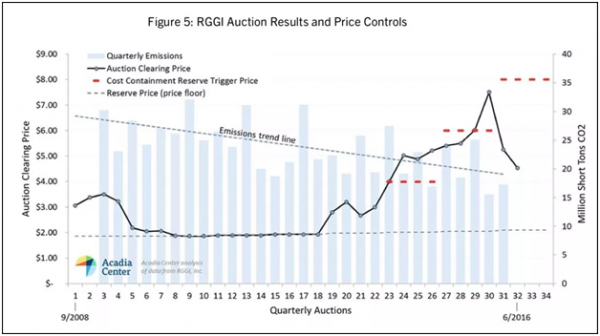
This chart shows how prices for carbon are set in the northeast based on progress toward emissions goals. Graph: Acadia Center
Mark Kresowik, regional deputy director Sierra Club, said: “Burning dirty motor fuels is the biggest source of health-damaging and climate-disrupting pollution, but we have the opportunity to put clean transportation in the fast lane and benefit the communities who have been the most overburdened and underserved by our current transportation system. As the Trump administration undermines clean car standards, our communities and states can lead to create jobs, increase affordable access to clean transportation, reduce pollution, and save people time and money. Everyone should have the opportunity to get from Point A to Point B quickly, safely, and affordably, without polluting our air and water and disrupting our climate.”
Ken Kimmel, president, Union of Concerned Scientists, said: “If we want to reduce the risks of climate change, it’s imperative to cut emissions from transportation— now the biggest source of carbon emissions in the Northeast and Mid-Atlantic region. The urgency of this moment also creates an opportunity to build a modern transportation system that’s cleaner, equitable, and offers more options in rural, suburban and urban areas alike. It’s encouraging to see states working together swiftly, and we look forward to continuing to work with our partners across the region to build a better transportation future.”
Chris Dempsey of Transportation for Massachusetts (T4MA) said: “Governors across the region have stepped up to address this issue, and advocates that care about transportation and the environment are here to back them up. Transportation is the largest source of air pollution in Massachusetts, and the market-based, regional approach championed by Governor Baker should be a cornerstone policy in addressing this pressing problem.”
Anne Kelly, vice president of government relations for Ceres said: “Investors and companies understand the economic imperative of tackling transportation emissions. The region has a tremendous opportunity to collaborate on a market-based program to create a clean, equitable and efficient transportation system that works for businesses and residents in the Northeast and Mid-Atlantic. Ceres looks forward to working with both private and public sector leaders to develop a regional program that will promote innovation and drive economic growth.”
Noah Dubin, Eastern states advocate for E2 said: “When it comes to transportation, what’s good for the economy is also good for the environment. Our business leaders stand ready to work with lawmakers up and down the East Coast to tackle our region’s transit challenges. Together, we can come up with the bold, business-first solutions that reduce emissions and can transform our transit systems into a model that grows the economy, attracts investment, and creates quality jobs.”
Morgan Folger, clean cars campaign director for Environment America, said: “To stave off the worst impacts of global warming, we need to cut carbon pollution as quickly as possible, get clean energy on the grid, and tackle what is now the region’s largest emitter of greenhouse gases — our transportation system. We use massive amounts of fossil fuels to move people and goods around the region, and that needs to change. We have the technology to replace this dirty system with clean, electric cars, trucks, and buses powered by the sun and the wind. Let’s make plugging in as easy as filling up.”
Leah Schmalz, Chief Program Officer for Connecticut Fund for the Environment/Save the Sound, said: “While it has been clear for some time that to combat climate change we must slash transportation emissions, for far too long we have focused on state by state action. But transportation pollution does not respect state lines, so our solutions must expand to cross state borders too. Our Transportation Coalition is a powerful alliance that together will make great strides in reducing air pollution, protecting public health, achieving our climate change mandates, and enhancing the economy of both the region, and individual states like Connecticut.”
Eugenia Gibbons, policy director for Green Energy Consumer Alliance said: “Energy consumers urgently need better, cleaner transportation options. Done right, TCI will be a tangible policy solution that can help us address both transportation and climate action. It will provide the resources needed to equitably invest in public transit and electric vehicles.”
Nick Zuwiala-Rogers, transportation program director for Clean Air Council said: “The Transportation Climate Initiative is an important opportunity to address not only climate change, but the multitude of other ways that transportation negatively impacts people’s health and quality of life. This initiative, and the programs and investments that come as a result of it, will help reduce our over-reliance on the automobile, and increase mobility in ways that are safe and sustainable. This initiative will improve public transportation, walking, and biking infrastructure, and prioritize equity, if implemented properly.”
Michelle Romero, national director for Green For All said: “People of color tend to live in one of two conditions — either they live in a transit desert without access to transportation that could connect them to jobs, education, and healthcare — or they live in dense urban neighborhoods surrounded by busy freeways, ports, and other major sources of emissions. But there’s a better technology out there now. We have the power to build a zero-emission future for all that cuts pollution and invests in solutions. We’re proud to partner in the effort to increase access to clean, affordable, reliable transportation in neighborhoods that need it most.”
About Our Transportation Future:
Our Transportation Future (OTF) is a coalition of local, regional and national organizations committed to modernizing transportation across the Northeast and Mid-Atlantic region. OTF is focused on improving our transportation system — the ways we move people and goods in the region – to spur economic growth, make us healthier and safer, clean up the environment, and improve our quality of life.
An improved transportation system means more clean cars and trucks, more reliable mass transit, more walkable and bikeable communities, and investments that connect everyone, including those in underserved and rural areas.
Our Transportation Future members include: A Better City, Acadia Center, Ceres, Clean Air Council, Clean Water Action, Climate Law and Policy Project, ClimateXChange, ConnPIRG, Connecticut Fund for the Environment, Connecticut Public Interest for the Environment, Conservation Law Foundation, Environmental Entrepreneurs (E2), Energize Maryland (logos shown above);
Also: Environment America, Environment Connecticut, Environment Massachusetts, Environment Maryland, Environment Maine, Environment New Hampshire, Environment New Jersey, Environment New York, Environment Rhode Island, Environment Virginia, Environmental Advocates of New York, Environmental League of Massachusetts;
Green Energy Consumers Alliance, Green For All, Health Care Without Harm, Maryland PIRG, Mass Climate Action Network, MassPIRG, NJPIRG, Northeast Clean Energy Council, Natural Resources Defense Council (NRDC), PennEnvironment, Sierra Club, Transportation for America, Transportation for Massachusetts, Tri-State Transportation Campaign, Union of Concerned Scientists, USPIRG, Vermont Energy Investment Corporation, Vermont Natural Resources Council, and 350 MASS for A Better Future.

